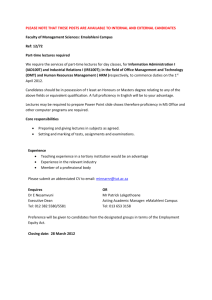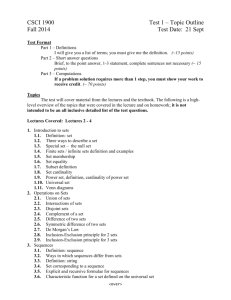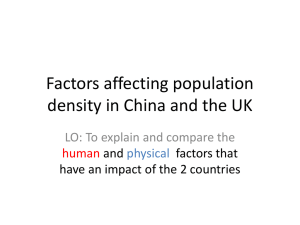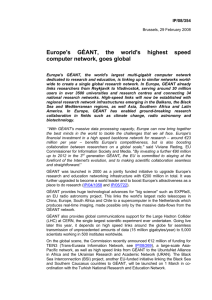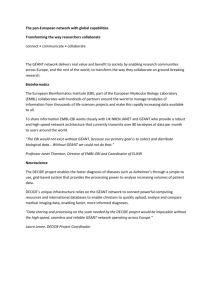ShanghAI Lectures
advertisement
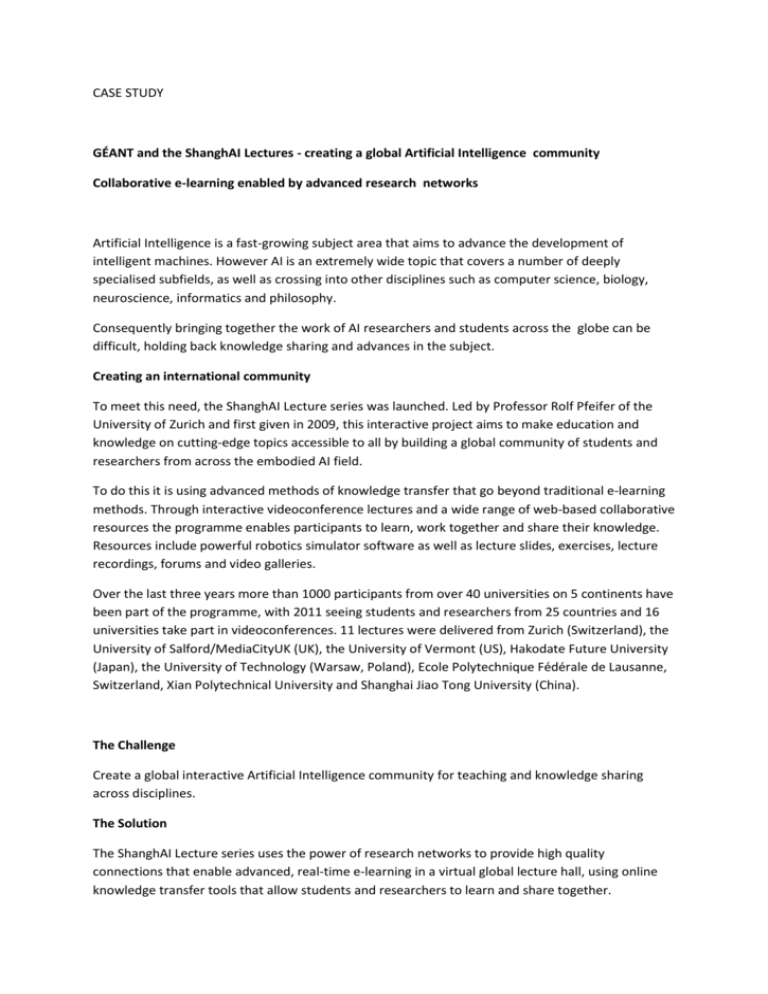
CASE STUDY GÉANT and the ShanghAI Lectures - creating a global Artificial Intelligence community Collaborative e-learning enabled by advanced research networks Artificial Intelligence is a fast-growing subject area that aims to advance the development of intelligent machines. However AI is an extremely wide topic that covers a number of deeply specialised subfields, as well as crossing into other disciplines such as computer science, biology, neuroscience, informatics and philosophy. Consequently bringing together the work of AI researchers and students across the globe can be difficult, holding back knowledge sharing and advances in the subject. Creating an international community To meet this need, the ShanghAI Lecture series was launched. Led by Professor Rolf Pfeifer of the University of Zurich and first given in 2009, this interactive project aims to make education and knowledge on cutting-edge topics accessible to all by building a global community of students and researchers from across the embodied AI field. To do this it is using advanced methods of knowledge transfer that go beyond traditional e-learning methods. Through interactive videoconference lectures and a wide range of web-based collaborative resources the programme enables participants to learn, work together and share their knowledge. Resources include powerful robotics simulator software as well as lecture slides, exercises, lecture recordings, forums and video galleries. Over the last three years more than 1000 participants from over 40 universities on 5 continents have been part of the programme, with 2011 seeing students and researchers from 25 countries and 16 universities take part in videoconferences. 11 lectures were delivered from Zurich (Switzerland), the University of Salford/MediaCityUK (UK), the University of Vermont (US), Hakodate Future University (Japan), the University of Technology (Warsaw, Poland), Ecole Polytechnique Fédérale de Lausanne, Switzerland, Xian Polytechnical University and Shanghai Jiao Tong University (China). The Challenge Create a global interactive Artificial Intelligence community for teaching and knowledge sharing across disciplines. The Solution The ShanghAI Lecture series uses the power of research networks to provide high quality connections that enable advanced, real-time e-learning in a virtual global lecture hall, using online knowledge transfer tools that allow students and researchers to learn and share together. Key Benefits Education and knowledge on cutting-edge AI topics are now accessible to the entire global community, bringing together students and researchers from disparate fields and disciplines as well as exploring new ways of virtual learning. Research networks underpin real-time e-learning Interactivity is at the heart of the ShanghAI project and ensuring seamless global delivery of the video lectures would be impossible to achieve cost-effectively through commercial internet providers. This means that the project relies on the high capacity, guaranteed bandwidth and speed of research networks. Lectures are recorded, stored, streamed and managed through infrastructure provided by Swiss national research and education network (NREN) SWITCH and then distributed via the GÉANT pan-European network to 12 national and international networks across the globe, including EUMEDCONNECT3, which covers the Mediterranean and ORIENTplus, which connects Europe to China. The technology and structure behind the lectures has also advanced in order to create a learning environment that crosses cultures. In 2009 and 2010 a 3D collaborative environment was trialled, which will be developed further in 2012, while in 2011 High Definition videoconferencing was used successfully at some sites. All of these innovations deepen the learning experience while at the same time requiring the increased capacity and speed that research networks bring. This document has been produced with the financial assistance of the European Union. The contents of this document are the sole responsibility of DANTE and can under no circumstances be regarded as reflecting the position of the European Union. connect • communicate • collaborate The world is criss-crossed with high-capacity data communications networks, connecting and serving research and academic institutions across the globe. The most advanced of these is GÉANT, which together with Europe’s national research and education networks (NRENs) connects 40 million users in over 8,000 institutions across Europe. GÉANT interconnects with counterparts across the world, such as those in Japan, China, the Mediterranean and United States of America. GÉANT and its partners including the Swiss SWITCH, UK JANET and Chinese CERNET research networks provide the ShanghAI Lectures with high capacity and guaranteed bandwidth to enable real-time global collaboration. Sharing video lectures and interactive resources across four continents requires seamless network communication. Without access to high speed research networks such as GÉANT to distribute and stream content this would not have been possible. “Artificial Intelligence is a truly global research area, crossing many different disciplines and cultures. Bringing this community together would be impossible through traditional means, but the use of advanced technology and high speed research networks has enabled us to create an interactive, vibrant collaboration between hundreds of students and researchers on four continents. This means that the ShanghAI Lectures have become much more than a series of videoconferences, and are serving as the foundation of a cross-disciplinary, worldwide community that continues to expand and grow, enabled by the power of research networks.” Professor Rolf Pfeifer, University of Zurich “The ShanghAI Lecture series is much more than a project to build a global AI community. It provides a unique opportunity to study worldwide team collaboration in virtual environments. Using research networks has helped us in our goal to investigate how internet-based collaboration technologies and the cultural diversity of team members affect group dynamics and performance. Based on the lessons learned from this large-scale international field study, we are looking to derive guidelines on how to effectively support the work of globally distributed teams.” Dr Béatrice Hasler, ShanghAI head of research, Interdisciplinary Center Herzliya, Israel Advancing global knowledge Feedback from participants has been extremely positive. Overall satisfaction marks of 70 per cent (3.5 out of 5) were backed up by comments such as, “A mind-expanding and inspiring lecture, touching a broad field of interdisciplinary research” and, “I couldn’t have ever imagined how good the lectures are. They are amazing! Thank you very much!”. Underpinned by global research networks, over the last three years the ShanghAI Lectures have fostered the development of a worldwide AI community. By essentially creating an interactive global lecture hall, the project has brought together students and researchers from multiple cultures and disciplines to share knowledge and advance the development of Artificial Intelligence work across the world. With further innovation planned for future lectures, this unique e-learning project provides new ways of collaborating and sharing for the AI community across the globe, as well as providing a new approach for worldwide teaching and information sharing that can be used across many other subjects. For more information: GÉANT: www.geant.net The ShanghAI Lectures: http://shanghailectures.org/ SWITCH: http://www.switch.ch/ EUMEDCONNECT: http://www.eumedconnect3.net/ ORIENTplus: http://www.orientplus.eu/



